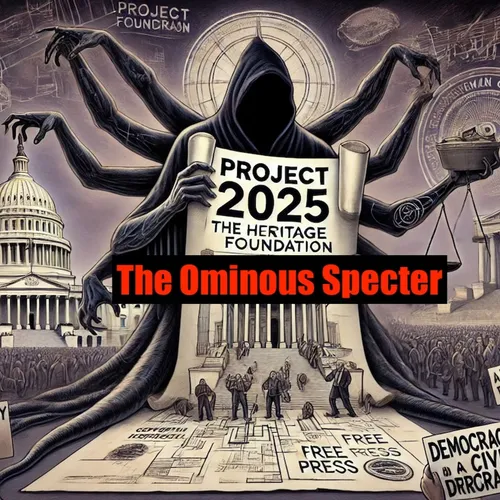Unleashing Radical Change: Navigating the Threat of Project 2025's Conservative Agenda
- Author
- Quiet.Please
- Published
- Thu 10 Apr 2025
- Episode Link
- https://www.spreaker.com/episode/unleashing-radical-change-navigating-the-threat-of-project-2025-s-conservative-agenda--65530776
As I delve into the intricacies of Project 2025, a comprehensive policy blueprint crafted by over 400 conservative scholars and experts, I am struck by the sheer scope and ambition of this initiative. Spearheaded by the Heritage Foundation, a think tank that has significantly influenced conservative administrations since the 1980s, Project 2025 is more than just a policy agenda; it is a vision for a fundamentally transformed America.
At its core, Project 2025 is a 920-page manifesto that outlines a radical policy vision for a future conservative administration. The project is built on four pillars: a detailed policy agenda, a personnel database of loyal conservatives, a private online educational tool to train these individuals, and an unpublished 180-day playbook for transition plans in the first six months of a new administration[3][4].
One of the most striking aspects of Project 2025 is its proposal to centralize power in the executive branch, significantly eroding the system of checks and balances that has been a cornerstone of American democracy. The plan aims to increase the president's authority over every aspect of the federal government, allowing for the dismissal of federal employees deemed 'non-performing' or insufficiently loyal. This is exemplified by the reissuance of Trump’s Schedule F executive order, which would permit the firing of career civil servants, a move that could disrupt the continuity and integrity of government operations[1][4].
The implications of such a shift are profound. As Dr. Ray Serrano, Director of Research and Policy at LULAC, notes, "Project 2025 represents a substantial threat not only to individual rights but also to the very foundation of American democracy. By seeking to centralize power in the executive branch, undermine civil rights, and erode essential social programs, this radical agenda prioritizes control over fairness, enforcement over welfare, and exclusion over inclusion."[1]
In the realm of reproductive rights, Project 2025 proposes sweeping changes that could drastically limit access to abortion and contraception. For instance, the plan includes a national abortion ban and restrictions on access to contraception. These policies are being tested incrementally, as seen in the recent legal challenges to the FDA's approval of mifepristone, an abortion medication. Although the Supreme Court dismissed the case on procedural grounds, it sets a precedent for future legal strategies aimed at restricting reproductive rights[1].
The project also targets immigration policies, advocating for the transfer of custody of immigrant children from Health and Human Services (HHS) to the Department of Homeland Security (DHS). This move would prioritize enforcement over welfare, potentially expanding detention centers and worsening the safety and psychological well-being of vulnerable immigrant children. Additionally, the proposal includes the repeal of parts of the Trafficking Victims Protection Reauthorization Act (TVPRA), facilitating large-scale detention center use across the country[1].
In the areas of media and technology, Project 2025's plans are equally daunting. The blueprint suggests weakening the reach and effectiveness of independent media by allowing the president to manipulate the FCC and launch antitrust investigations into media companies that criticize the administration. This could result in the revocation of broadcast licenses for major networks, depriving Americans of vital information about government activities. As Roxana Muenster from Brookings notes, "Project 2025’s policy recommendations should be cause for concern: Congress enacted the 1967 Public Broadcasting Act because they believed an educated and informed citizenry was in the public, local, and national interest."[2]
The project's economic and educational policies are also far-reaching. It proposes cutting the growth of government...
